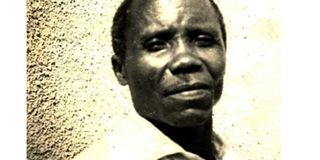Katiikiri: The man who fed future leaders

Eriya Katiikiri
What you need to know:
- What can one really say about Katiikiri except to thank the Lord that one was privileged to know him and to enjoy his service?
- We honour Katiikiri by recognising that people like him are the critical members of any establishment.
Dear Tingasiga:
Memories of 1966 flood black with torrential force. That bloody year of political and military turmoil stands out like a sore thumb in Africa’s history.
Though I was aware of the news reports and listened to my parents discussing the political upheaval with their friends in sombre, funereal tones, I neither understood their impact nor allowed them to distract me from my pursuit of happiness. In any case, my early adolescence was a very local affair.
My world was Kigezi High School (KHS), where I had enrolled as a junior boarding student in January 1965. Great school it was! Great teachers and fantastic classmates and seniors! But please don’t ask me what I learnt.
The academic facts that I crammed have long been deleted from my memory. What remains vivid is my culinary experience under the ministrations of a fine gentleman called Eriya Katiikiri ka Mugaara ya Buhiire bwa Mpabuka ya Kabuguma ka Murema, Omusigyi w’Omurunga. We simply called him Katiikiri. He was the school’s head cook.
Students of my generation, with our fading memories, struggle to recall the names of some teachers and fellow inmates of boarding schools. However, mention Katiikiri and you see bright facial expressions of grateful students, decades after their exit from KHS.
By the time I arrived, Katiikiri had already been at his station for more than 20 years. He had fed thousands of boys, my father among them, most of whom were destined to become very accomplished contributors to Uganda and beyond.
Nearly all ex-KHS students that I have spoken with about Katiikiri remember a man of grace, easy laughter, a great sense of humour, clean habits and total dedication to his job and his charges. In my two years at the school, there was no epidemic of gastrointestinal infection, reflecting his meticulous attention to hygiene in the food preparation and serving process.
To me, Katiikiri’s lowly position was the most important and most indispensable at school. All meals were served on time, his offerings always a delight to the palate. To convert raw foods into delicious ticklers and pleasers of the ravenous palettes of hundreds of students was no mean achievement.
What strikes me today is that Katiikiri, who lived 12 km away in Nangara, was always on time to serve us breakfast at 7:30am and would be there when we had dinner at 7pm.
He chose to walk, perhaps run, the 24 km up and down the hills everyday because he wanted to live with his family in his own home. His was a commitment to duty and family that was the way of life those days.
According to James Rushwiga, one of his sons, Katiikiri son of Mugaara was born in 1920 in a home located where Kigezi High School Primary School is today.
When the colonial authorities zoned the land for school development, they relocated Mugaara and his family to Nangara, a place behind the north-eastern hills overlooking Kabale Town. Katiikiri, in his 20s, was offered a job as head cook at KHS. In addition, his sons would receive free education at the new primary school, paid for by European colonial workers. It was a classic case of giving a hand-up to a man and his family, an act that would change Katiikiri’s path.
Although he did not receive any formal education, Katiikiri learnt to speak English through exposure and acquired culinary skills that would have ordinarily required time in cooking school.
He had 14 children, eight of whom are still living. They had education that enabled them to educate their own children. Many of Katiikiri’s grandchildren are successful and contributing citizens, among them Waa Byamukama, a Kampala-based lawyer.
Byamukama was very helpful in getting me written information from Rushwiga. In August this year, Rushwiga sent me a written note and a photograph of his father. The timing was divinely prescient. Rushwiga died three months later.
What can one really say about Katiikiri except to thank the Lord that one was privileged to know him and to enjoy his service?
We honour Katiikiri by recognising that people like him are the critical members of any establishment. In my book, the cleaners, estate maintenance people, cooks, drivers and security guards are the true VIPs (very important persons) in any organisation.
Without a Katiikiri, my life at KHS would have been very difficult. That he was a kind, generous and assuring person made his department the most popular for students. His handiwork pleased a succession of headmasters and teachers who kept him at his post for over thirty years.
He continued to work as head cook for another nine years after I left KHS, still walking the 12km to and from work everyday, until his failing heart disabled him shortly before his premature death in 1975. He was only 55 years old.
Katiikiri is buried at his home in Nangara Aha Kagoye, in Rubanda District. There are no physical monuments in his honour. However, his monument is the pleasant memory that has not faded half a century later. He gave his best.
[email protected]



